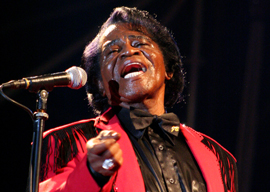
August 06, 2014

James Brown
Source: Shutterstock
In the endless struggle among African-Americans between the dominant liberal W.E.B. Du Bois wing and the Booker T. Washington tendency, Brown preached Washington’s self-help philosophy. One of his songs was entitled “I Don”t Want Nobody to Give Me Nothing (Open Up the Door I”ll Get It Myself).”
Unfortunately, after decades of abstaining from drugs and campaigning against them (firing perhaps his most gifted sideman, Bootsy, for being high on stage), when Brown finally succumbed in his fifties, he picked the worst drug ever: angel dust. Get on Up opens with a 1988 incident in his strip mall in Augusta, Georgia in which a shotgun-wielding Brown, out of his gourd on PCP, took hostage an entire insurance seminar for using his private bathroom.
Even so, the movie skips over much of the weirder part of the James Brown story, such as his reportedly playing “Say It Loud”I”m Black and I”m Proud” at Richard Nixon’s inaugural ball in 1969. Nixon’s strategy of “black capitalism” suited Brown ideologically, so he endorsed Nixon in the Oval Office in 1972. Brown even stood by the besieged Republican in 1973, releasing “You Can Have Watergate, Just Gimme Some Bucks and I”ll Be Straight.”
Brown admired fellow connivers like Nixon, which is why his handful of close friends included Strom Thurmond, the late 100-year-old Republican senator, and the Reverend Al Sharpton, whose conked hairdo is a tribute to his surrogate father’s bouffant.
Nor do we see Brown’s last hit, “Living in America,” in which JB welcomes befuddled Soviet superman Ivan Drago to a flag-bedecked Las Vegas in a hilarious scene in the ultimate Reagan era movie, Rocky IV.
And finally there was the huge lawsuit over his estate among the countless individuals claiming to be his heirs, including his legitimate grandsons Forlando and Romunzo Brown.
But the pieces that fit inside Get on Up are entertaining enough.
Here’s a warning, though. People my age don”t go to the movies much anymore. We have lots of reasons to explain why, usually involving the bad behavior of today’s youth, such as talking through movies. Myself, I haven”t noticed that audiences are getting worse.
What I have noticed is that as I get older, my hearing isn”t as good, and that’s a bigger problem in the theater than the living room. More and more I find myself wishing I had a remote control in my hand to turn down the explosions and turn up the dialogue, or maybe turn on the closed captions.
Get on Up takes that need for subtitles to a new height. Chadwick Boseman, who was dignified as Jackie Robinson in last year’s baseball movie 42, is uncanny as James Brown. But part of his impact is that the great majority of his dialogue is accurately incomprehensible.
Brown wanted it that way. It was in his legal interest that no witnesses could ever agree on exactly what he had said. As one of his lawyers”and Brown needed many lawyers”noted, he was “exceptionally slick and conniving and he made sure”made sure”he was misunderstood.”
Thus, Boseman’s James Brown sounds like Chris Tucker doing an impression of Michael Jackson doing an impression of Moses Malone. That’s not just my aging white ears, either: Eddie Murphy admits he never understood a word Brown said.
So if you want to actually understand the dialogue, wait until Get On Up hits Netflix.